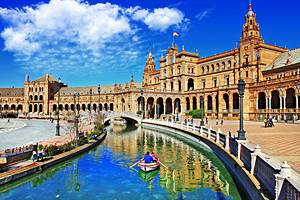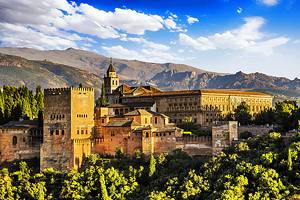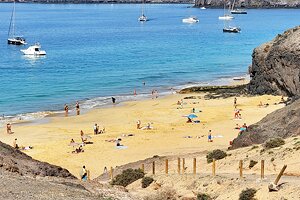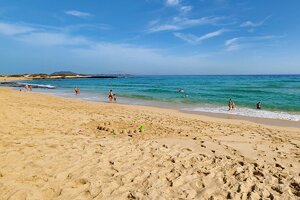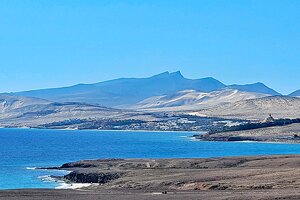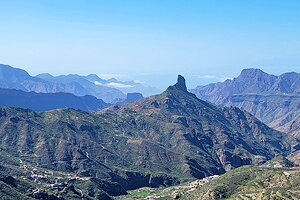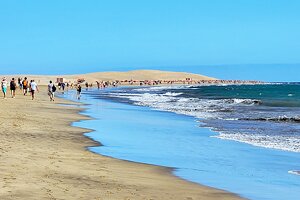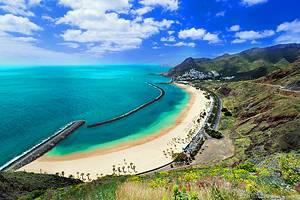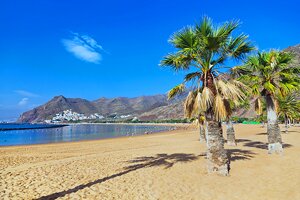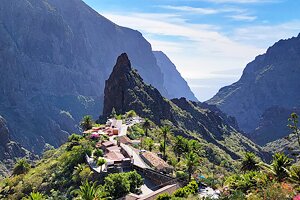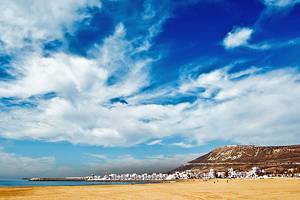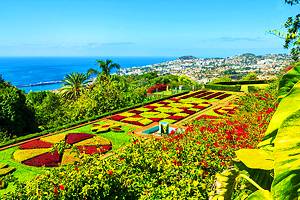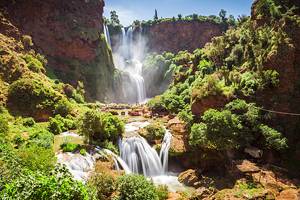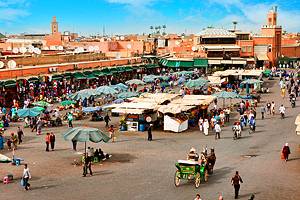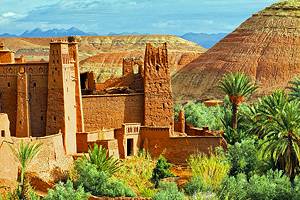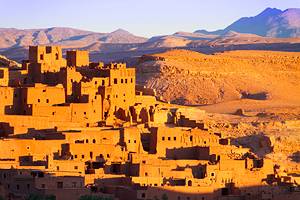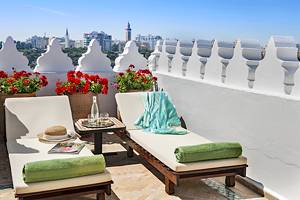Things to Do on Lanzarote
Authors Michael and Lana Law enjoyed a month of island-hopping in the Canary Islands. Lanzarote was a highlight for them.
Lanzarote is a favorite island for those who like to explore. It's blessed with interesting things to do and places to visit that range from lava tubes, green lakes, salt flats, and volcanoes to spectacular beaches lapped by crystalline waters.
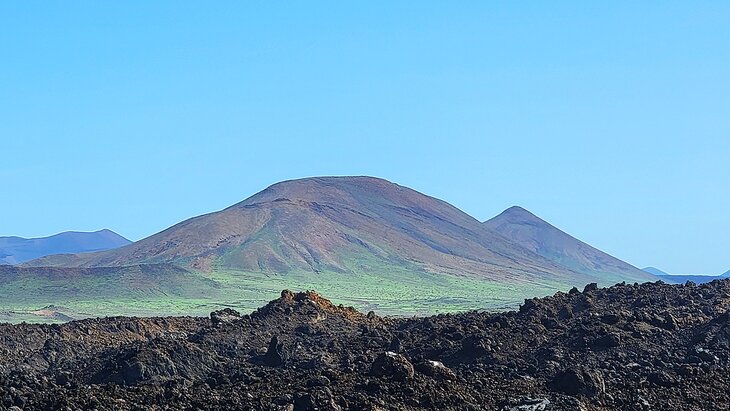
The most northern of the main Canary Islands, its recent volcanic history makes it unique. Barren stretches of black lava are juxtaposed with azure waters and golden-sand beaches. Less busy and less predisposed to mass packaged tourism than some of the other islands, the place has a more relaxed feel that once discovered, entices people back year after year.
Plan your Lanzarote adventure with our list of the best things to do on Lanzarote.
Visit Timanfaya National Park
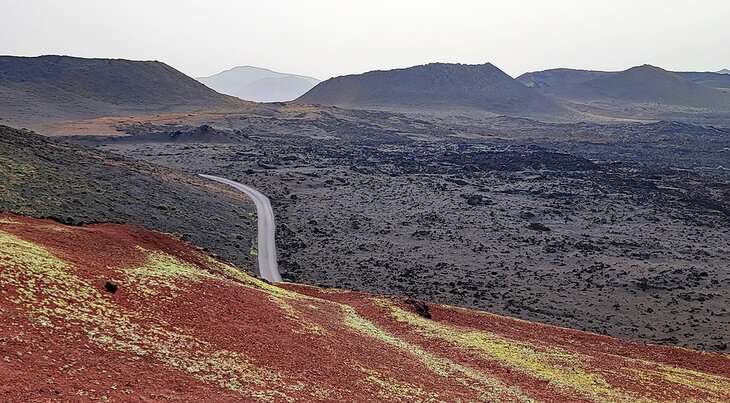
Truly one of the most spectacular volcanic landscapes in all of Spain, the Timanfaya National Park should definitely be at the top of your Lanzarote things to do list. This black wasteland of volcanic rock and rubble devoid of almost all life is a fascinating sight to behold.
Several roads crisscross the park providing wonderful views along the way; however, it's off LZ-67 that you'll find the main visitor center along with Islet Hilario. The visitor center is near the entrance to the park and is free to enter. A wide variety of interesting displays about the park and the Canary Islands are worth a look, and the simulated volcanic eruption is fun for children.
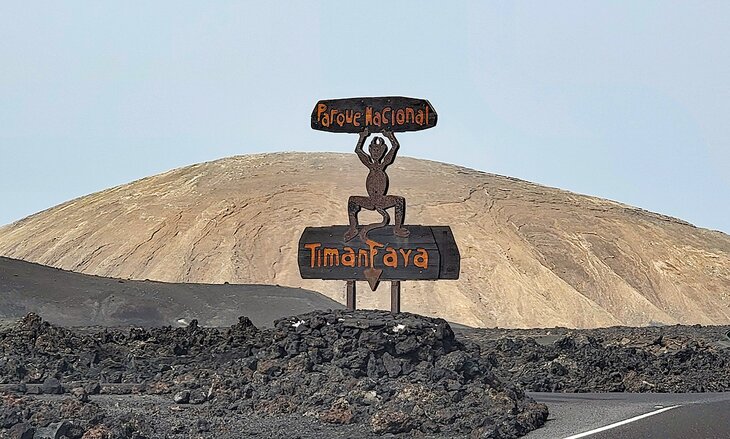
The real highlight of Timanfaya National Park is Islet Hilario. This part of the park has magma close to the surface and as a result, the entire area is extremely hot. A fun and fantastic experience not to be missed is watching the park staff pour water down a tube, then run away as a blast of steam erupts from the earth. Park staff also take brush and drop it down a shallow hole and within seconds of touching the hot rocks below, it ignites in a burst of flame.
To see the rest of the park, you'll need to board a bus (each bus has different languages) and take a 40-minute tour. Pre- or post-tour, grab a bite at the César Manrique-designed El Diablo Restaurant; they use the heat from the earth to cook the food.
Take a Scenic Drive through La Geria
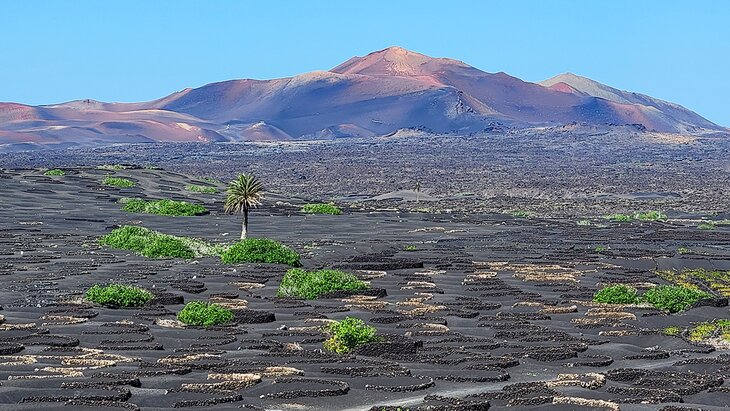
A scenic drive through La Geria for a little sightseeing is a must-do on Lanzarote. You'll quickly understand why this is one of the most interesting islands in Spain. The black and barren landscape has been transformed for agriculture. Set against the mountainous backdrop, it's a spectacular sight.
Lanzarote receives virtually no precipitation all year, so local farmers have had to get creative to coax life out of the lava fields.
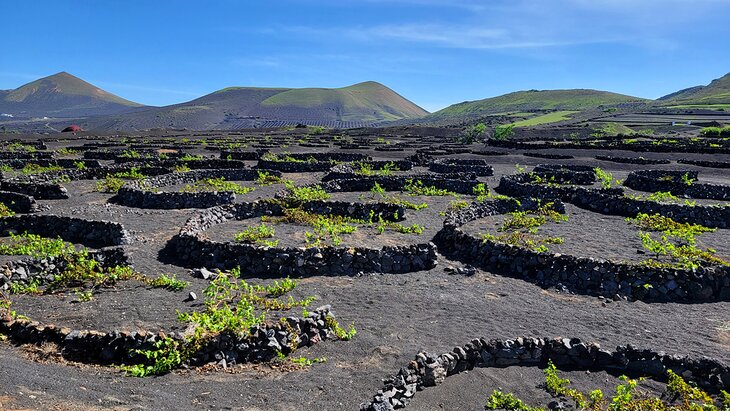
As you drive along highway LZ-30, you may notice thousands of stone arcs with dugouts in the middle across the plains and up the hillsides. It's through these stone structures and dugouts that the plants are able to get whatever condensation occurs at night or when fog banks roll through.
It's a highly photogenic place to visit, not just for the lava fields. The area looks onto the back side of Parque Nacional de Timanfaya. The volcanic peaks shimmer in black and red in the distance.
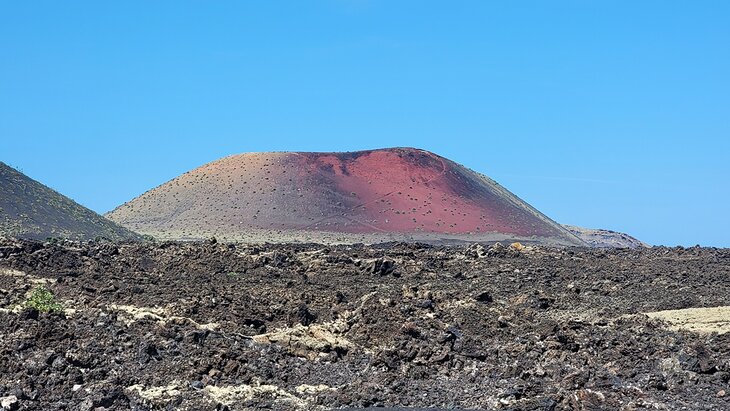
You can stop along the way in La Geria at a roadside restaurant. Eat outside and soak up the views.
If you are out for a day of sightseeing, combine a drive through La Geria with a visit to Parque Nacional de Timanfaya.
Cueva de los Verdes (lava tube)
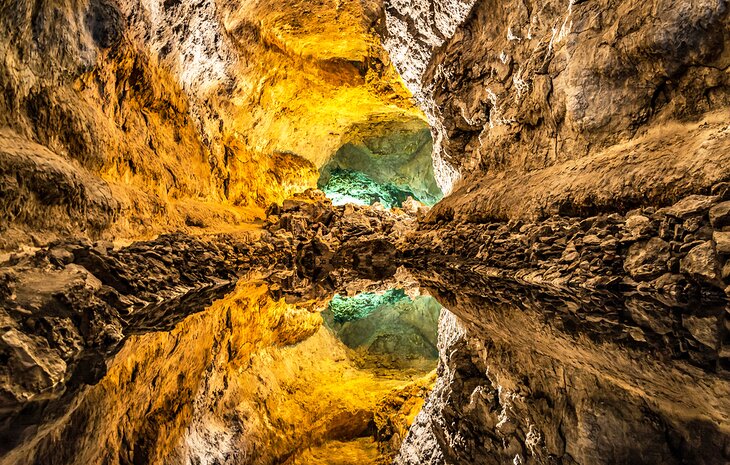
One of the island's top attractions lies not on the surface but hidden underground beneath a massive lava field. The Cueva de los Verdes is an eight-kilometer lava tube formed 4,000 years ago when the La Corona Volcano erupted.
The lava tube is easily visited by descending via a staircase down beneath the earth. Once underground, an easy-to-follow trail takes you past the highlights of the lava tube. These include the Room of the Esthetes, the ominously named Death Throat, and the Moorish Gate. At the end of the path is an impressive underground cliff.
A guided visit usually takes a little under an hour. Wear comfortable shoes, as the ground is uneven. Lineups to enter the cave can be extensive, especially if a cruise ship is in town. Plan to go early if you can peel yourself away from the pool.
Los Hervideros
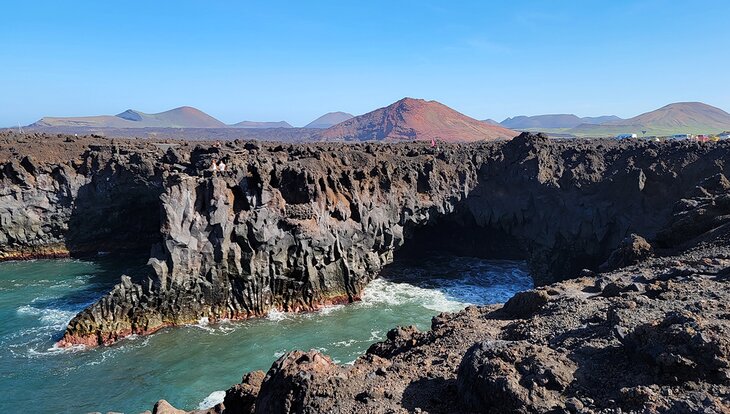
If you've been to Charco de los Clicos and are on your way to see the Salinas de Janubio, be sure to make the short detour to Los Hervideros. Not only will you pass by the beautiful Playa Montaña Bermeja, but you'll also be treated to some of Lanzarote's most incredible coastal and inland scenery.
Here, along the island's wild west coast are jagged inlets carved out by the incessant pounding of the Atlantic Ocean. Trails wind their way to impressive lookouts and down to viewpoints into caves where the water roils and boils with incredible force. A fall from here into this maelstrom would be a one-way trip to the great beyond.
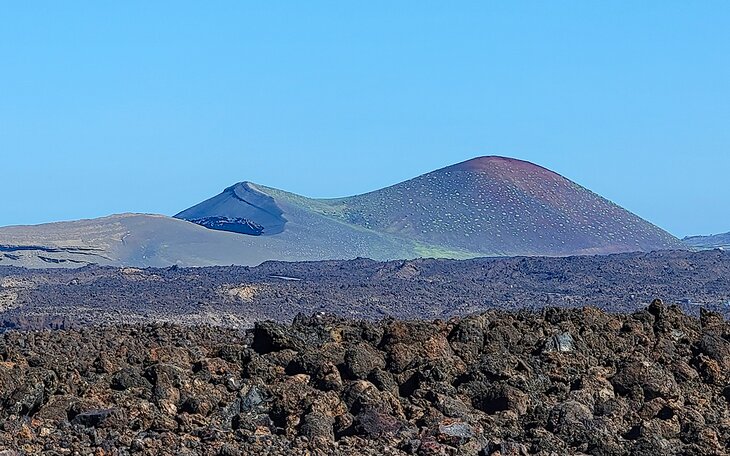
Although it may be difficult to turn your attention away from the ocean and the rocks below, be sure that you do. The views back over the surrounding volcanic landscape when contrasted with the jagged rocks and azure ocean are incredible.
Lanzarote Beaches
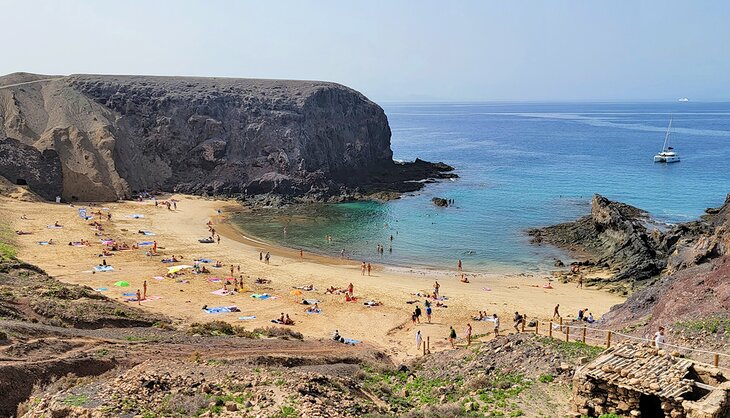
For an island that is volcanic in nature and with rugged coastlines, Lanzarote has a fine selection of beautiful and unique beaches — some natural and some manmade. The beaches are spread around the island; however, the best ones are in the south and southeastern areas.
One of Lanzarote's most photographed beaches is Playa Papago down near the resort town of Playa Blanca. Set between two headlands, this arc of golden sand is a top destination for those who love the beach. Playa Papago is protected from the predominate northeast winds, ensuring calm waters. Bring your snorkel gear; the waters just offshore have an interesting assortment of marine life.
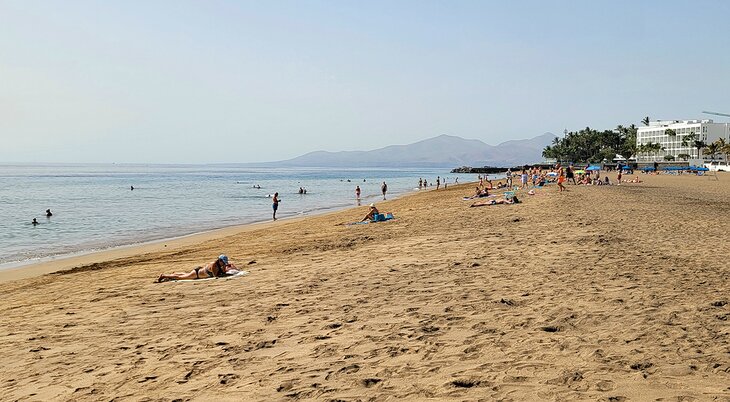
The entire area around Playa Papago is full of fantastic beaches. Be sure to check out Playa del Pozo and Playa Mujeres, many people feel that these larger beaches are better than the well-known Playa Papago.
Another good spot for sun and sand is the town of Puerto del Carmen. The massive, and appropriately named, Playa Grande, is a lively beach with sun beds, umbrellas, and volleyball courts. Behind the beach runs Avenue de las Playa, a fun street chock-full of restaurants, with great patios and shops selling beach gear and souvenirs.
Read More: Beaches in Spain
Jardin de Cactus
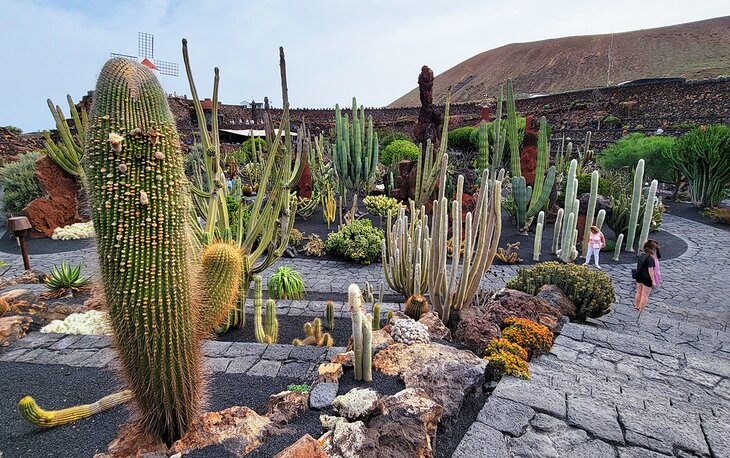
The idea of visiting a cactus garden may not be on your list of things to do when visiting Lanzarote (or any place!); however, make sure you give this one a try. Designed by César Manrique, this circular garden is unlike any you've ever visited.
The Jardin de Cactus is an excellent thing to do as a family. The weird and wonderful cacti from around the world are endlessly fascinating for all ages. The cacti in the garden are artfully arranged, with stone paths winding their way in and around all the highlights.
Eventually, you'll find your way up to the windmill at the far end of the garden. Views from here over the small town nearby are quite pleasant. All those green things you see growing below you are cacti as well.
A small on-site restaurant serves light fare, coffee, and cold drinks. Their patio is a pleasant perch out of the sun and an ideal place to sip on your drink and gaze out at the spiky wonderland below you.
Address: 35627 La Lajita, Las Palmas, Spain
Charco de Los Clicos at El Golfo
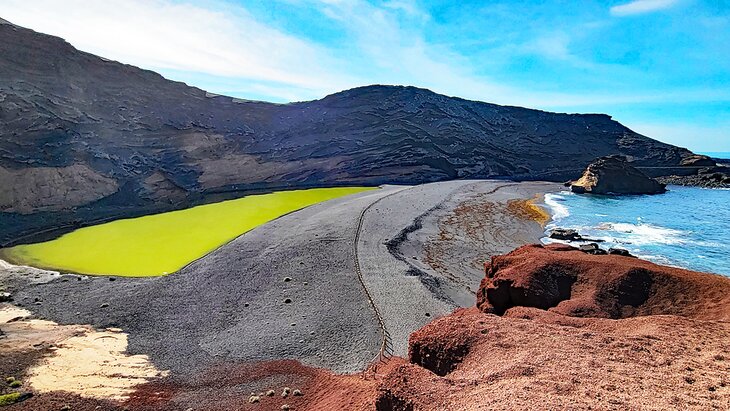
The Charco de los Clicos is a must-see attraction in the southwest corner of Lanzarote. A spectacular green lake is set against a black-sand beach with the azure waters of the Atlantic Ocean in the distance.
The Charco de Los Clicos is accessible by walking down to the ocean and following the shoreline; however, most people are happy to walk the short trail to the lookout. From up here, you'll have a panoramic view of the whole area, including the dramatic cliffs that rise up from the lake.
The area just demands to be photographed. A tip for shutterbugs is to go in the afternoon. The Charco de Los Clicos faces west, so you'll need to wait until the sun comes around and illuminates the lake and the cliffs behind.
Jameos del Agua
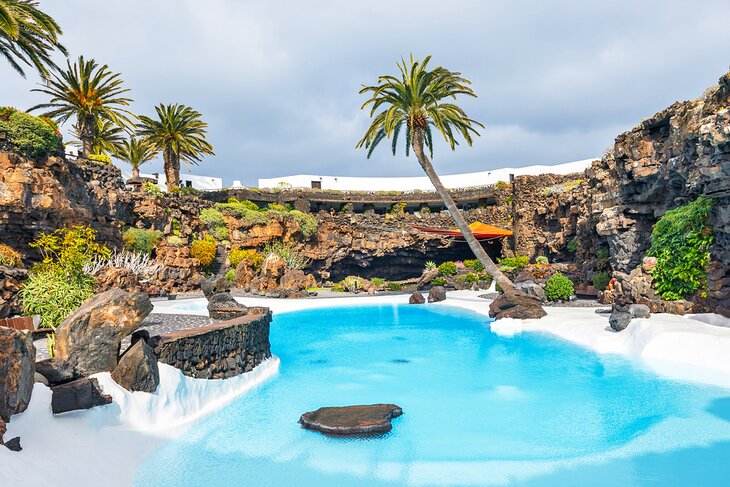
This fascinating place is one of César Manrique's most ambitious projects. In the years leading up to its opening in 1977, he took what was once a barren lava tube and open cavern and turned it into a spectacular public performance space.
The Jameos del Agua is well worth a visit. Stop in and have a pleasant meal at the restaurant located in the remains of a lava tube. After lunch, follow the scenic pathways past the pool, the Tunnel of La Atlántida, and the saltwater lake, all the while keeping an eye out for the endangered blind crabs that call this place home.
The Jameos del Agua is free to visit.
Address: LZ 204, Parcela 109, Carretera Arrieta - Órzola S/N Lanzarote, 35542 Punta Mujeres, Las Palmas, Spain
Taro de Tahiche
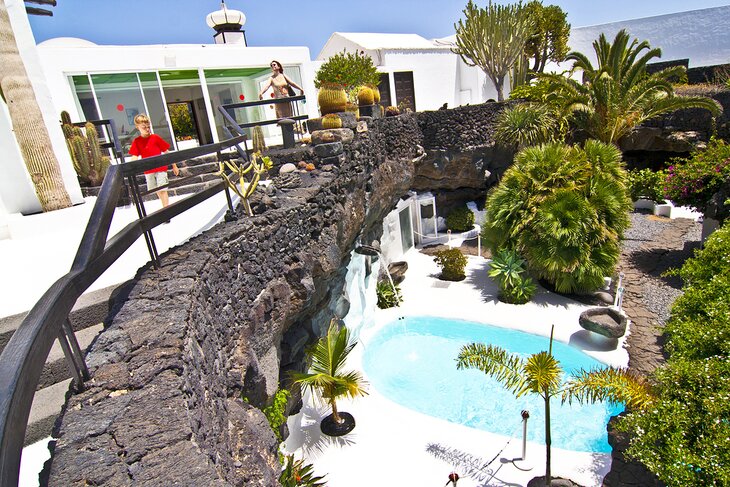
If, after wandering around Lanzarote and seeing the influence the artist César Manrique had on the island, you are curious about where he lived, swing by his home for a tour. Named Taro de Tahiche, this interesting place is built right into the surrounding environment.
The upper floors are traditional, but it's what lies below ground that is most interesting. Utilizing the volcanic landscape, César Manrique incorporated tunnels and open lava bubbles to build several structures, the most impressive being the pool area.
Also worth seeing during a visit is the artist's studio; many of his paintings are on display here.
Mirador del Rio
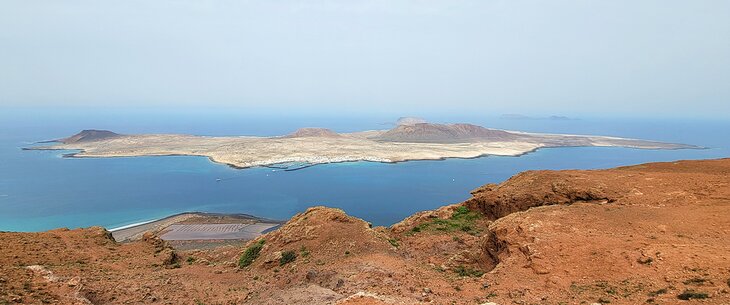
Drive up, up, and up again from the oceanside to the Mirador del Rio. Located at the far northern tip of the island, the Mirador del Rio is perched up high and provides the best views on Lanzarote.
Park your car and walk up to the unique building at the end of the road to pay your admission to the viewing platform. This building was designed and built by the famous architect César Manrique, who utilized items found in the local environment in his construction.
The admission fee is relatively steep. If you'd like to keep some of those Euros in your pocket, just walk down the narrow roadway running along the cliff edge. The views out from here are equally spectacular; you'll see La Graciosa in the foreground, Isla de Montaña Clara just beyond, and, on a clear day, Isla de Alegranza.
La Graciosa
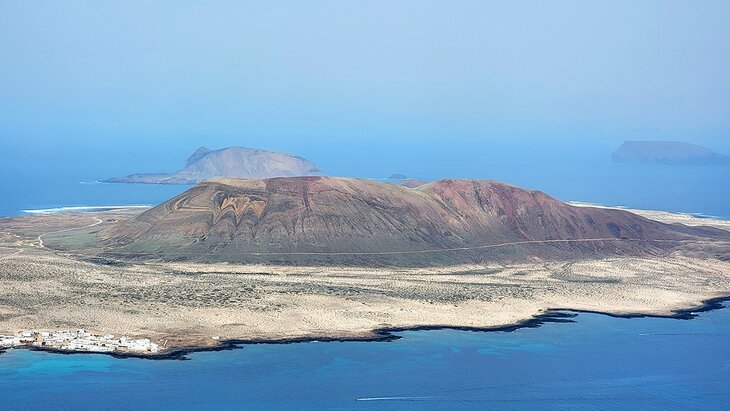
If you crave beach and nothing but beach, a trip to La Graciosa should be on your agenda. This undeveloped volcanic island off the north tip of Lanzarote has everything the adventurous beachgoer wants. Shallow warm waters lap at the golden sands, while just offshore, boats bob gently in the small waves.
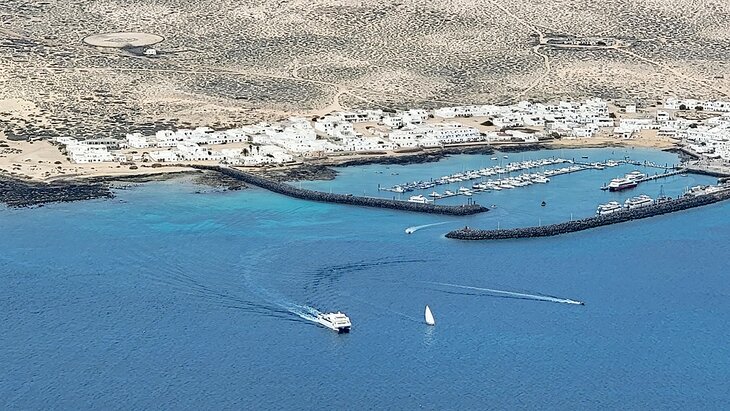
Perhaps the most beautiful of these beaches is Playa de la Concha. Incredible views out to Isla de Montaña Clara greet you as you wade into the warm translucent waters. The entire island and waters surrounding it are part of the Reserva Marina del Archipielago Chinijo, resulting in prolific marine wildlife ideally explored with a snorkel and fins.
Most people arrive on La Graciosa on a sightseeing tour, but if you prefer, a ferry leaves from Órzola, and the ride takes about 25 minutes.
Road Biking
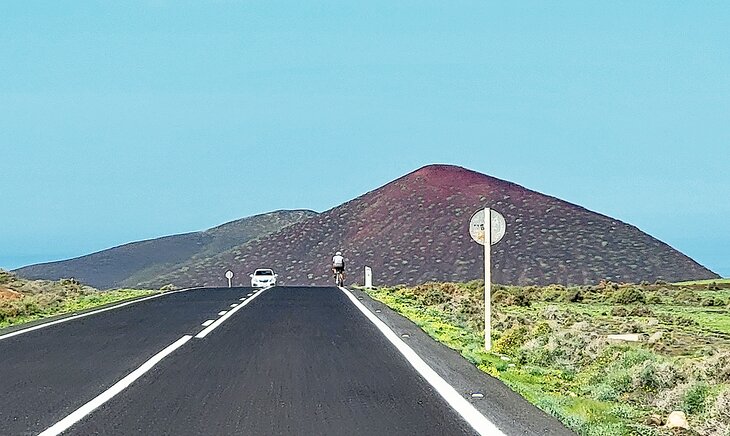
Road biking trips to Lanzarote are incredibly popular. The island has an incredible road system of smooth asphalt that will take you to some incredible places. It's these roads that draw road bikers from around the world. Motorists are generally respectful towards bikers; they give them a wide berth.
Over the years, Lanzarote has built out new roads, and it's on these roads that a majority of the cars travel. The original roads with all their twists and turns remain, and the island has designated them as bike routes with low speeds.
Roads in the south tend to be flatter and easier, and the route to Los Hervideros and Charco de los Clicos are truly spectacular. In the north, the descent down LZ-203 is not to be missed. The island is well-serviced by bicycle shops offering first-class rental equipment and advice on where to go and what to see based on your level of fitness.
Salinas de Janubio
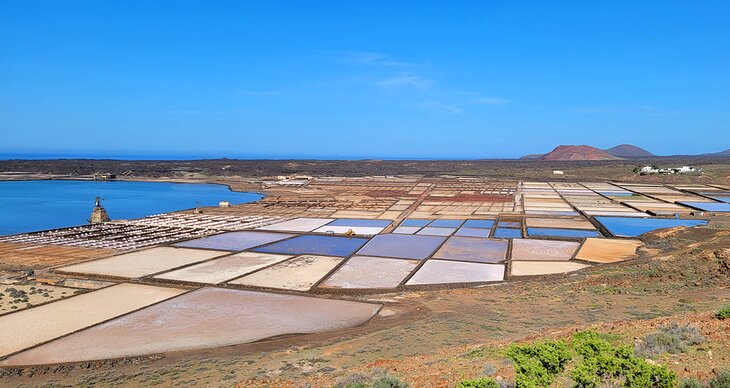
Just down the road from Los Hervideros, the Salinas de Janubio are a fascinating relic of salt production in the Canary Islands. The current salt flats, one of only two production facilities remaining on Lanzarote, date from the turn of the 19th century.
The salt is harvested twice a year in the spring and in the summer, so if you want to see the process in action, plan your visit at that time. That said, the Salinas de Janubio is open year-round for tours that take you down among the evaporation pools and provide an excellent overview of the production process. An on-site shop sells several versions of salt, including the sought-after Fleur de Sel.
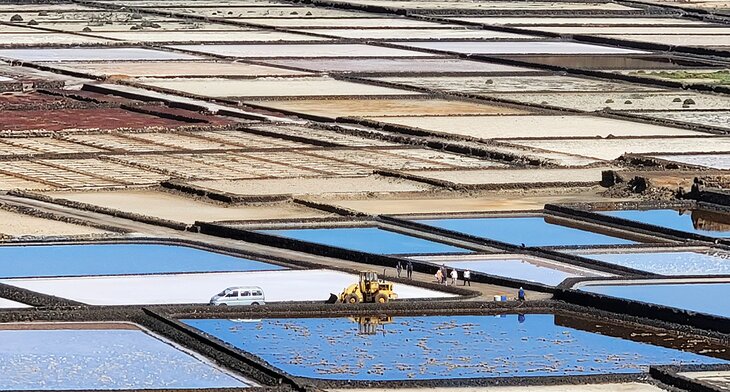
Photography tip: if you want to get the best shot of the salt flats with the mountains behind, head south down LZ-701 to the point. Along here, you'll find a large pull-out with parking and a viewpoint.


